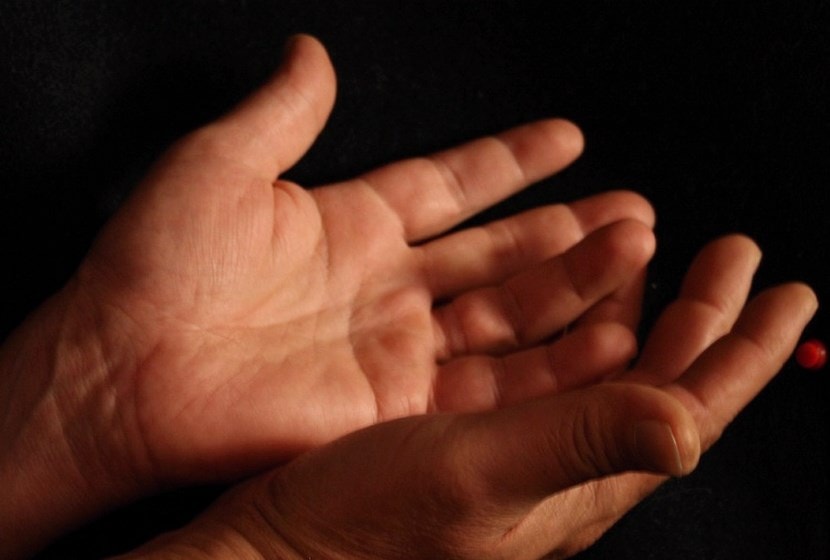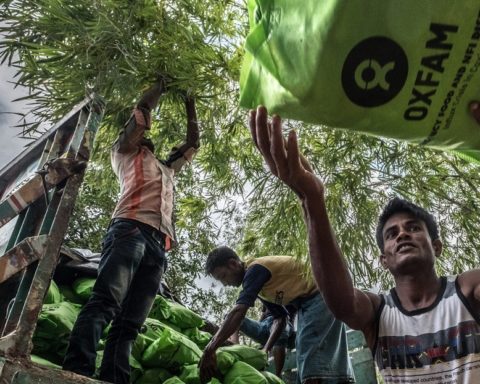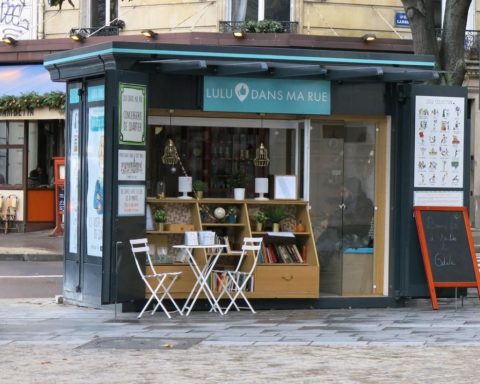Used in economic life for its function of redistributing wealth for the benefit of the poorest, donation, when truly disinterested, generates an economy of its own. Effective against violence, social exchanges inspired by the ethics of giving are nowadays experiencing a significant boom. They encourage the emergence of skills such as mediation, which are essential for safeguarding the link between generations and communities in our democracies. This situation is prompting a growing number of companies to be more vigilant in assuming their social responsibilities in the city.
"Every gift is a mysterious leap out of determinism. The gift is the state of a person who is connected to the expression of life, to creation".
Jacques Godbout
« IHere, order is "played" by an art". Michel de Certeau
 The impasse of utilitarianism
The impasse of utilitarianism
Photo: Jan Svankmajer's work "The Utilitarian Slave" - 1978
Between the ambiguous charitable practices authorized by our Societies and those that are solely based on the ethics of giving, there is a distance from the abyss. That which separates purely disinterested motivations from others.
In families respectful of the translations, education in charity is well ordered and prescribed to begin "with oneself". Often the giving of charity to others is nothing more than a sharing of the superfluous, all the more painless for the giver, since it gives him a gratifying psychological advantage over the one who is obliged to him: "always the hand that gives is above the hand that receives." says the proverb. The Littré dictionary, under the same heading, in conclusion of the word give, is a crude summary of the utilitarian philosophy of his century: "you don't give anything for nothing". For its part, informed opinion has always been suspicious of charitable practices, especially when they purport to reduce the ethic of giving to a mere ethic of debt.
By transforming the voluntary contributions of the rich into legal obligations and the subsidies to the poor into welfare rights, the welfare state does not escape the trials of intent either. In short, the function of the welfare service has much in common with that of the Dantan work lady, in that both serve to compensate for certain effects of the dysfunctions of the Society, not to eradicate their causes.
Neither volunteering nor the willingness to give oneself "without counting the cost" alone can guarantee the ethics of giving. But they can contribute positively to the establishment of an economy of giving in many sectors and activities, such as health, education or community life, for example. For its part, it should be recalled that the proper functioning of the Merchant Society requires the respect of a common ethic among its actors, implying in particular mutual trust and honesty. "The spirit of giving, "observes Jacques Godbout, in the book with that title, "fits any terrain. It is everywhere in the commercial sphere. Is he an accomplice? A saboteur? A messenger from the past, from the future? I make the assumption that he is the standard for humanity. Utilitarianism is an illusion, an anachronism. » (1)
 That certain behaviors of hyper-rational appearance are only illusory is a fact of experience, abundantly illustrated by the Surrealist School. We owe it to the sociological analyses of the 1970s and, in particular, to the work of the Surrealist School. Michel de Certeaus, an original approach to this same phenomenon, when they describe The "tricks, the different desires, the tireless poaching of ordinary people" going so far as to threaten to "crumble the dominant system of rationalized production". (2)
That certain behaviors of hyper-rational appearance are only illusory is a fact of experience, abundantly illustrated by the Surrealist School. We owe it to the sociological analyses of the 1970s and, in particular, to the work of the Surrealist School. Michel de Certeaus, an original approach to this same phenomenon, when they describe The "tricks, the different desires, the tireless poaching of ordinary people" going so far as to threaten to "crumble the dominant system of rationalized production". (2)
It is no doubt for this reason that, at the same time, the leaders of this system, in order to perpetuate it in a "more humane" way, had the instinct to call upon strategies of trust inspired by the ethics of giving, such as non-commercial communication, which was thus taking its first steps. As soon as the dreaded "crumbling" turned into a dreadful fracture, the effort to be made for the renewal of the Society was no longer limited to the economic sphere of the developed continents alone.
 Founder, following in the footsteps of the author of "L'Essai sur le don", Marcel Maussof the Anti-utilitarian Movement in Social Sciences (AMUSS). Alain Caillé establishes the following dignostic: "The utilitarian imaginary degrades reason into rationalism and democracy into technocracy... it reduces human subjects to the sole play of economic interests. It therefore becomes urgent to reverse the trend, to take a fresh look at the gigantic, obscure continent of what remains to be thought and built. (3)
Founder, following in the footsteps of the author of "L'Essai sur le don", Marcel Maussof the Anti-utilitarian Movement in Social Sciences (AMUSS). Alain Caillé establishes the following dignostic: "The utilitarian imaginary degrades reason into rationalism and democracy into technocracy... it reduces human subjects to the sole play of economic interests. It therefore becomes urgent to reverse the trend, to take a fresh look at the gigantic, obscure continent of what remains to be thought and built. (3)
This continent is none other than the space inhabited by the ethic of giving, in the sense given to this word by the M.A.U.S.S. : It is a "service provided without a guarantee of return, with a view to creating, nurturing or recreating the social link between people". (4)
 A huge continent to explore with new eyes
A huge continent to explore with new eyes
No matter who we belong to, we are all children of the gift. « Life, wrote Denis Vasse, is a gift, not a due. Received, we don't owe it, but it continues to be given by us. Life is free... " (5).
This truth does not only concern the sphere of parent-child relations, but also the networks under the influence of the gift economy. Concrete or spiritual, ignored or savoured as such, true benefit is always offered purely gratis. Its consistency can only be analysed in terms of testimony. Let us listen to this shipwrecked survivor: "As I was expecting to freeze to death, I felt carried and warmed by a heat of unknown origin and was able to wait long hours for help to arrive. I heard that I had fallen into the gulf stream"!
Tailor-made solicitude of mysterious origin, entailing neither debt nor obligation to whomever encounters it, such as a presence in solitude or a fire in wandering... these experiences have echoes in all cultures and under all latitudes.
 This phenomenon inspires the philosopher Jacques Derrida a hypothesis: "The real gift would be the gift of someone who, without reason, gives without knowing what he is giving, to someone who would never owe him anything, since he would never know that he was given... only one is a gift that does not bear that name". (6)
This phenomenon inspires the philosopher Jacques Derrida a hypothesis: "The real gift would be the gift of someone who, without reason, gives without knowing what he is giving, to someone who would never owe him anything, since he would never know that he was given... only one is a gift that does not bear that name". (6)
Among other consequences, this definition renders null and void the conditional clauses that poison, from the cradle, the so-called gifts of the fairies. But it in no way contradicts this imperative, inherent in the nature of the gift: for the gift received, wherever it comes from, to bear fruit, its dimension of otherness in the space of the one who receives it must be respected. This aptly named process of recognition does not impose an obligation in a deterministic way. But it does give access to a new freedom: that of being able to introduce the gift, like a seed of life, into a new land, thus enlarging the sphere of the common good.
"By surrendering ourselves to the experience of giving, by accepting to be overwhelmed by what passes within us, observes Jacques Godbout, in his lecture on the language of giving (7), "one lives something that is not foreign to the mystical experience. The gift is, in a way, the democratization of this experience in Societies that have eliminated non-rational forms of experience".
If its origin is unknowable and its destinations unpredictable, the spirit of the gift, once called "providence", admits multiple identities and reaches, in discrimination, the rationalist, who will call it a "republican miracle", as will the believer, who will most often lend it the face of an angel.

(1) Jacques Godbout, in collaboration with Alain Caillé, Editions La Découverte, Paris 1992 and Editions du Boréal, Montreal 1992
(2) Michel de Certeau, L'invention du quotidien tome 1 / coll 10/18, UGE Paris 1980
(3) Alain Caillé, Critique de la raisonutilitaire, La Découverte Paris 1988
(4) Ibidem and A. Caillé " Donation, intérêt et désistéressement ", La Découverte Paris 1994
(5) L'autre du désir et le Dieu de la foi " Denis Vasse, Le Seuil 1991
(6) Quoted by Maurice Godelier, "L'énigme du don" Fayard 1996.
(7) Editions FIDES, Montreal 1996
{jacomment on}












